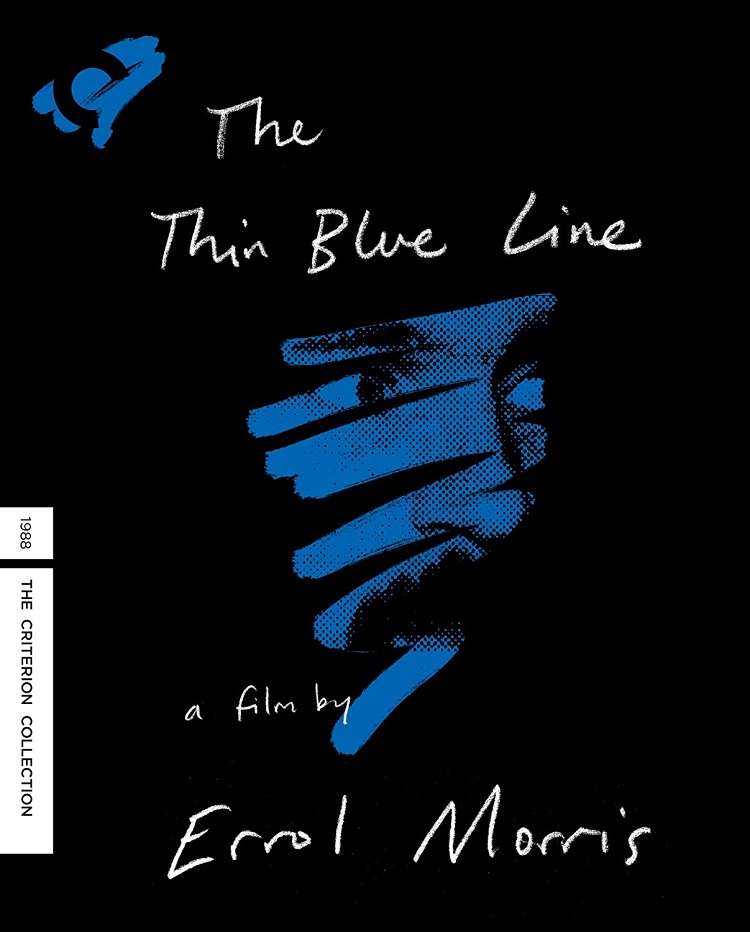
Rarely do you watch a film and actually pinpoint where a genre actually changes. You watch Clerks or Pulp Fiction and see where the genre is being moved forward. You can see in Batman and then again in Iron Man where a genre is being reinvigorated. But in 1988, Errol Morris made The Thin Blue Line and the field of documentaries would radically change. I was surprised that it had taken this long for the Criterion Collection to release this important film on Blu-ray.
Documentary. The definition for years was simply to “document reality”. The popular documentaries were often nature films or concert films. They could be newsreel style to show historical events. This is quite an oversimplification of everything in the genre but even the Cinema Verite movement of the 1960s and 1970s worked within the constraints of the established subjects. It was the freedom of the handheld camera that started to add the level of a auteur showing the viewer what they wanted us to see, not just presenting it as it happened. A film like The Whole World Is Watching did this deftly in the late 1960s on the subject of the Democratic National Convention in Chicago in 1968.
In 1988, Errol Morris had already released two interesting documentaries Gates of Heaven (1978) and Vernon, Florida (1981) that addressed unique subjects but still worked within the normal scope of the documentary. Watching The Thin Blue Line now, it’s hard to remember the reactions when it played in Ann Arbor, MI when I was living there in the late 1980s.
The film is structured around looking at the murder of Robert W. Wood, a police officer from Dallas, Texas in November of 1976. This isn’t just a run-of-the-mill TV news story account of a murder from 12 years ago. It’s equal parts implication of our justice system, indictment of corruption in police work, and an investigation of the murder ending in the revelation of the actual killer. How many movies can say they saved the life of their subject?
Everything from the very start is different from what your expectations of a documentary should be. It’s presented much more like a arty film noir. The Philip Glass soundtrack is more suited to a crime film than a presentation about a murder. There are recreations of documents, reenactments, and none of the usual naming of interviewees on screen like you would expect. That alone throws you off-kilter. That feeling of unease is a perfect setting for the story that will also make you doubt what you know. People are dressed in what feels like costumes to blend in better for interviews.
What all of this accomplishes is to make you look at the evidence in a different way. It also does one important thing for a film – it makes the words and body language of the people he is interviewing the most critical things for you to judge. You aren’t worried about making judgements based on actual footage or documents or people dressed as they would walk the streets. The words and the voice and the facial expressions of the interviewees tell the story ultimately.
I was thrown off for years by the reenactments. I’ve come to appreciate that much like a photograph or a drawing, this is a way to present the “truth” of the action by taking out ancillary facts that just distract. But what the film does better than almost any ever made is tell a compelling story. You aren’t just getting facts but you are discovering a truth. The story unfolds on the screen.
If I think of the best documentaries since this film, they all are searching for that voice to tell their story. They are using their own versions of the stylized interview and the reenactment (maybe now with photographs and music or animation). The first ones that come to mind – Hoop Dreams, Bowling for Columbine, and The King of Kong – all are in the shadows of The Thin Blue Line. They aren’t solving a murder but they are creating a narrative that is closer to a work of fiction to tell a compelling story. The direct descendants of this film are ones like Paradise Lost on the West Memphis Three and currently The Staircase about Michael Peterson and The Jinx about Robert Durst.
The Criterion Collection release is up to their usual high standards. The restoration is superb. There are a couple interview extras including Joshua Oppenheimer and Errol Morris, a NBC News Report about Randall Adams’ release from prison, and an interesting essay by Charles Musser.
Watch this film because you love the way that true stories play out over manipulated fiction. Watch this because you can step outside yourself as a viewer and see how you are affected by what the director chooses to show the viewer. Watch this because over the course of the 102 minutes, the idea of the documentary changed in 1988 and we are arguably in the Golden Era of the genre right now.